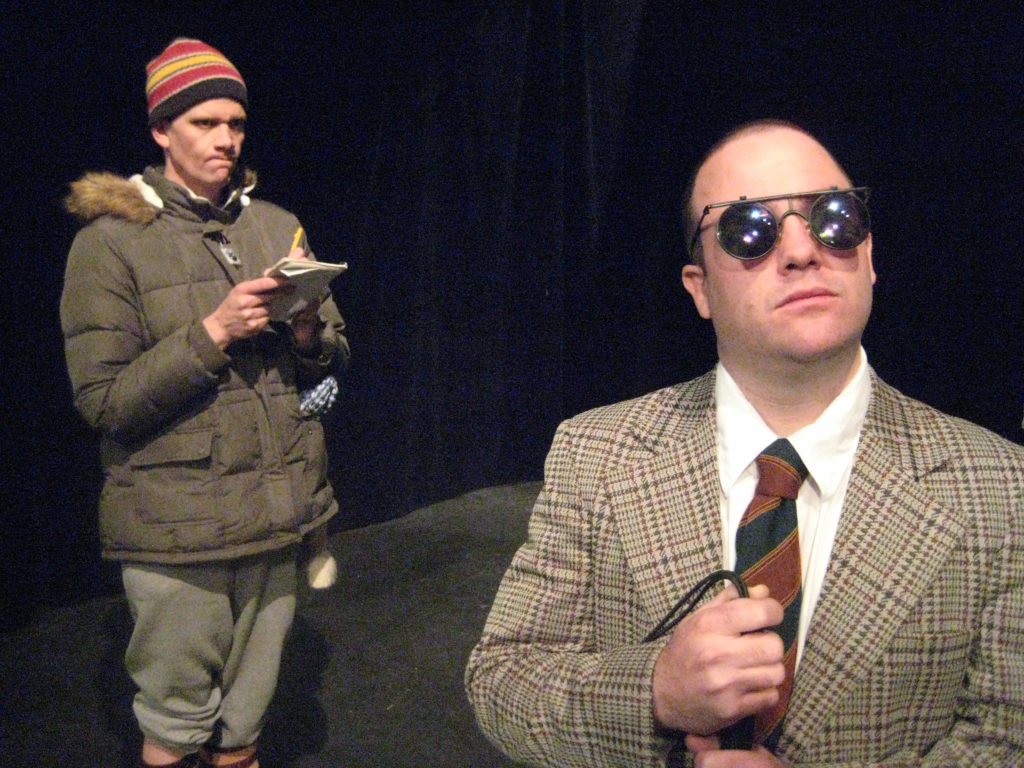Ovid, otherwise known as Publius, has been banished from Rome and is traveling with Tiresias, standing at a crossroads, sticking out his thumb. Actually, he’s packed Tiresias in his bag, which the blind seer fiercely resents. In a fit of fury, Ovid burned the single copy of his epic poem Metamorphoses, and he’s desperately trying to remember the words. Pretty soon, he’s recaptured the first four lines, leaving a mere 12,000 or so to go. Ovid and Tiresias are joined by Io, the woman transformed into a cow by Zeus to avert the jealousy of his wife, Hera. A car pulls to a halt; seated inside is a contemporary couple: schoolteacher Louis and his wife, Carol – neither of whom seems surprised to learn they’re transporting an ancient Roman poet and two mythical characters, but both of whom have problems of their own. For example, Carol is slowly but surely transforming into a chicken. Naturally, before the play’s over, she and Io will bond.
Louis and Carol comment on their own names, and references to Lewis Carroll’s Alice in Wonderland follow. This befuddles Ovid and his companions, who’ve never heard of the guy, but we in the audience recognize the allusion to another narrative heavily reliant on the theme of transformation. Between spurts of laughter – because the dialogue is very funny – we muse on just how potent the idea remains and how eternal questions continue to tease the imagination about the difference between illusion and reality, the connections between humans and animals, and our puzzlement about just what we are and what we may become. We’re not surprised when Kafka’s Metamorphosis is mentioned, and many of us remember how beautifully Buntport translated that haunting text into theater some time ago.
And, of course, transformational magic is exactly what Buntport is about. This theater is a place where objects become people and an ingénue becomes a goldfish. If mythological and realistic figures are to mingle and writers to meet their own works of fiction, this is where it should happen.
Still, there’s nothing heavy or pretentious about Anywhere But Rome. The play, an original Buntport creation, is lighthearted and good-humored. Like Ovid’s original work, it deals primarily with love. At one point, Carol attempts to teach Io to play badminton, and though the poor hoofed creature simply can’t swing her racquet, she loves the vocabulary of the game: “let” signifying a do-over; the repetition of the word “love.” As she proclaims later in the car, “Let love all.” And Ovid does love her. There’s no need for a counter-transformation scene, no need for her to become woman again; he loves her as she is. But then again, she is his creation. Louis can’t seem to muster the same feelings for his increasingly chicken-y wife, though her concern for him is so strong that she lays egg beaters rather than eggs to protect his heart.
Five actors – Erik Edborg, Brian Colonna, Erin Rollman, Evan Weissman, Hannah Duggan (SamAnTha Schmitz is the non-performing member of the troupe) – effortlessly hold our attention through the hour and a half of playing time. The dialogue is fast, clever, very human and sometimes wonderfully petty in the face of the great mysteries being evoked. There’s none of Buntport’s usual low-cost, high-concept technical wizardry in the set, but much care has gone into the costumes. The cow outfit is amazing, and whoever found the sweet, blond-plaited, too-small mask with which Io attempts to cover her bovinity should get a medal. As for the acting, these actors are at the pinnacle. They’re relaxed and full-throated and funny; their timing is perfect. Erik Edborg is riveting as irritable, slightly out-of-it and sometimes profound Ovid. Brian Colonna, who can tear up the stage with cartoonish squeaky-voiced antics when he wants to, makes Tiresias the wise, if kvetchy, center of the action. You never see Rollman’s face, but her stumbling body as Io attempts to balance on her hooves speaks volumes, as do her low moos and moans. Hannah Duggan is perfect as loud, sad, loving Carol, and the monologue in which Evan Weissman explores Louis’s shortcomings as a teacher and his possible role in his wife’s transformation is nothing less than inspired.
The Victorians used the word “transported” to indicate that someone was filled with emotion; they wrote of transports of grief and characters being “transported by joy.” I’d like to suggest a variation: When you’re seized again and again by helpless, fizzy giggles, consider yourself Buntported.
-Juliet Wittman, November 19, 2008, Westword
